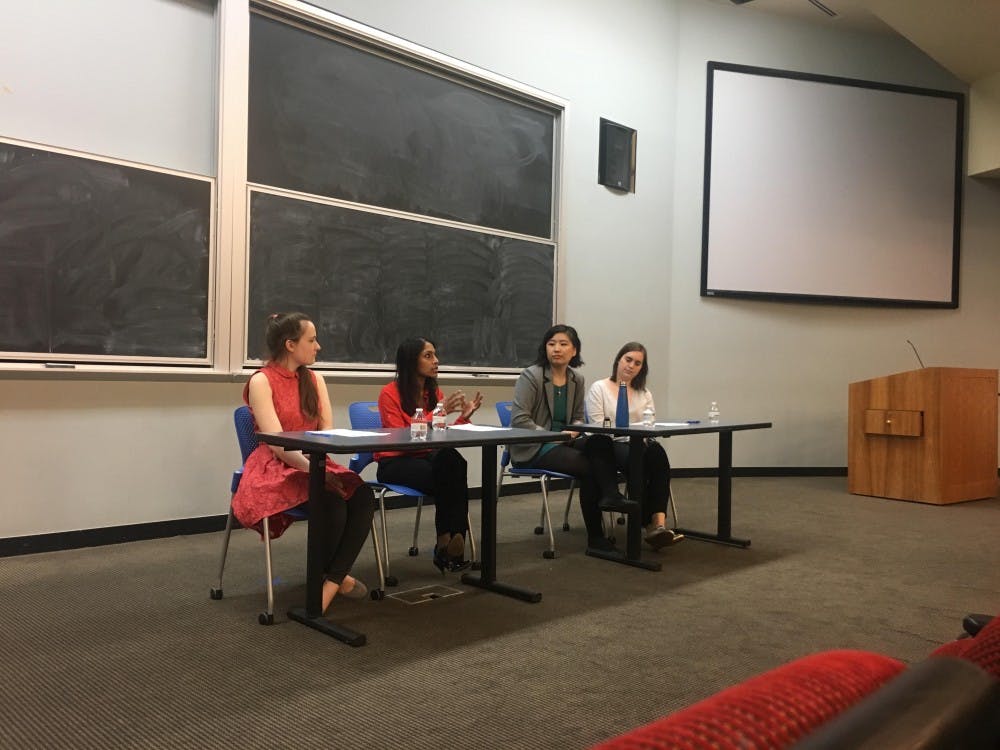Krishanti “Krish” Vignarajah, a female candidate for governor of Maryland who is currently running against seven male candidates, moderated a panel discussion titled the “Sexual Harassment Symposium” on Wednesday.
The event, which took place in Hodson Hall, was co-hosted by the Hopkins College Democrats, Hopkins Feminists and JHU Voice for Choice and was intended to further the conversation of the #MeToo movement.
A main focus of Vignarajah’s political campaign is the reduction of sexual assault and harassment throughout the state. As a supporter of the #MeToo movement, Vignarajah has proposed a state agency that would reduce rape kit backlog, monitor state offices, identify repeat offenders and provide supplemental services to survivors.
Vignarajah stated that Americans need to make sure that their elected officials support those who speak out against sexual assault.
“Let survivors’ voices not fall on deaf ears,” Vignarajah said.
In addition to Vignarajah, the panel was composed of Madelynn Wellons, a sophomore and sexual assault survivor, Christine Fei, class of 2016 and former co-director of the Sexual Assault Resource Unit (SARU) and Fabiana Diaz, an activist and sexual assault survivor.
The conversation first touched on the subject of sexual assault on school campuses, the resources provided to survivors and the process of reporting sexual offenders.
“The process needs to be changed and needs to be more survivor-centered,” Diaz said.
She feels that it is important for colleges to tell sexual assault survivors that they believe their stories and to provide a safe space for them to talk.
The panelists also called for other resources such as permitted leaves of absence from school and an increased accessibility to counselors who specialize in addressing sexual assault cases.
“You should not be losing scholarships or financial aid if you need to take fewer classes a semester because you were assaulted,” Fei said.
Fei is currently the research manager at End Rape on Campus (EROC), an advocacy organization aiming to end sexual violence on college campuses.
She stressed that often, people are not able to leave a toxic workplace because they struggle with financial difficulties, including unaffordable housing or poverty.
Fei also called for a broader definition of the workplace.
“We usually think of an office setting, but we also need to think about sex workers and decriminalizing sex work,” she said.
In regards to preventative measures, the panelists discussed how to improve education on sexual assault and consent. Vignarajah mentioned that starting this school year, public schools in Maryland that use the Family Life and Sexuality curriculum introduced a new policy to clarify the meaning of consent.
“In Maryland, the definition of consent is a clear, unambiguous, knowing, informed and voluntary agreement between all participants to engage in each act within the course of sexual activity,” Vignarajah said.
Last March, the Maryland House of Delegates agreed to support a bill requiring Maryland public schools to teach a “yes means yes” sexual consent standard. The bill took effect on July 1, 2017.
The bill also stipulates that a previous relationship does not constitute consent, and it cannot be achieved through threat of force or coercion.
Wellons stressed that education preventing rape culture should begin well before sexual education in high school. She emphasized the need to counter what she called a “boys will be boys” mentality and suggested that education can begin as early as preschool.
She elaborated that boys often get away with objectifying girls in early childhood.
Wellons gave the example of a boy pulling a girl’s hair and harassing her and their teacher excusing that behavior as the boy liking the girl.
“Not only does this show her that she does not own her own body, but it shows him that he can do actions like this,” Wellons said.
She called for a greater need for educators of young children to take initiative in preventing these types of actions early.
“I’d like to see teachers being trained to notice this behavior when it starts,” she said.
Wellons also noted that this type of unwanted sexual behavior is not always in regard to the male being the perpetrator and the woman the victim, but it could be vice versa, or it could be a same-sex or non-binary interaction.
On the same issue of early education, Diaz stated that this is not something that girls need to learn as a preventative measure.
She also said that people should stop fixating on the difficulties of raising girls because they are at a higher risk of experiencing sexual assault than boys.
“People always say: ‘How am I going to raise a girl in this world?’” Diaz said. “The question people should be asking is, ‘How am I going to raise a boy?’”
Panelists argued that, with the media attention that the #MeToo movement is currently generating, activists have a good opportunity to draw a larger audience.
Fei believes that this is not breaking news and that this is a recurring theme throughout history.
“So often the responsibility is on the survivor to come forward and to reveal their pain and trauma to the world in order for people to start to care and think this is a serious issue,” Fei said.
She elaborated that society should reassess how it treats survivors of sexual assault.
“When people are telling their stories, it should be very clear what justice looks like and what healing looks like,” she said.
In order to change the current culture, panelists agreed that a lot of the change has to come from policy makers at local, state and federal levels.
The evening concluded with the panelists urging the audience to vote in the upcoming election for representatives who have plans to enact sexual assault preventatives and support survivors.
Junior Sarah Linton appreciated the event for illustrating how the University’s reporting practices for sexual assault could improve.
“I really appreciated survivors being willing to sit on a panel and talk about their experiences, because they have the best insight into how to make University reporting practices a lot better,” Linton said.
Junior Bianca Martone felt that the symposium was very informative.
“I’m glad I came because this is obviously very important to talk about, and I want to do more,” Martone said. “It was insightful and an eye-opening experience.”























Please note All comments are eligible for publication in The News-Letter.